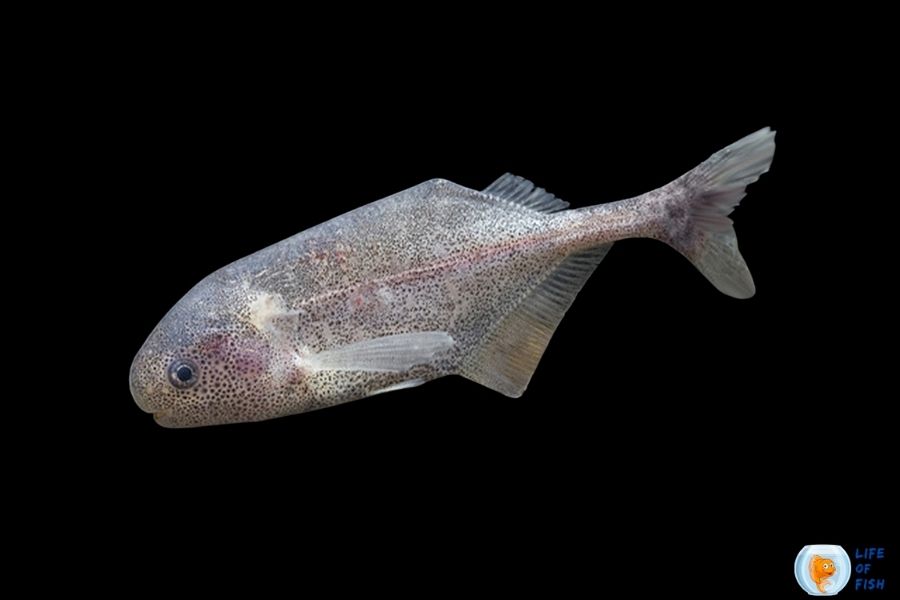If you are interested in adding more fish to your baby whale tank you should learn about possible baby whale fish tank mates.
Baby whale fish are freshwater fish resembling the appearance of the whales as well as their behavior. They have great personalities. They are a good suit for a community tank because of their generally peaceful temperament.

Characters for good Baby whale fish tank mates
Jump To
The compatibility of other fish is an important factor. The other tank mates should not be too small because they can be prey for baby whale fish.
On the other hand, if they are too large and carnivorous then they begin to pick on the Baby whale fish.
The baby whale fish can be stressed out and be attacked by aggressive fish. Therefore it is good to avoid aggressive fish species like cichlids.
In addition, other factors such as their type ie; whether freshwater fish or another type should be considered.
Consider their preferred environmental conditions, water quality, and tank decorations before selecting mates for the Baby whale fish.
It is always good to select tank mates who have the same preferences because it makes all fish live happily.
More on, fish that show territory behavior is not a good match because in a limited space they can be aggressive.
Concern on the size and number of fish which you are going to put and select the suitable tank size because limited space creates stress for the fish. It affects their growth as well as their health.
Baby whale fish tank mates
Considering the above characteristics below fish species are a good suit for a community tank with Baby whale fish.
01. Elephant Noses
Elephant nose fish tend to live solitary and they are aggressive on other fish of the same species.
Since the Baby whales and Elephant noses belong to two species they can be put in the same tank.
Their size is well-matched with Baby whale fish and is a good tank mate for Baby whale fish. However, these fish need water parameter priority, and be careful and monitor water parameters regularly if you wish to put Elephant Noses.
02. African Black Knife fish
The African Black Knifefish is a peaceful species and will generally get along well with all tankmates too large to be prey.
Unlike many Knife fish species, they are friendly and social. They are also more active at night than daytime and prefer to hide in caves and tunnels when there is too much light.
Hence they are a good match for a community tank with Baby whale fish.
03. Synodontis Catfish
Synodontis Catfish are generally peaceful fish species hence they are a good match for a community tank.
The length of an adult of this species is eight inches which is the maximum length for the Baby whale fish too.
It reduces the threat of prey by both fish species because they are the same in size. Both the Synodontis Catfish and the Baby whale fish prefer the same environmental conditions and therefore they can be good tank mates.
04. Clown Loaches
The clown loach is a peaceful fish and coexists well with nearly any tankmate.
Like the Baby whale fish, they don’t like bright light and tend to hide in caves, holes, and other hiding places during times when they get bright light.
The maximum length of this species is 12 inches and they are not very large fish that prey on Baby whale fish.
More on their Orange and black striped body, red fins, and active behavior have made it one of the most popular picks for a community tank.
05. Gourami
Gouramis are peaceful, docile fish that do well in community tanks. They are slow-moving and better to accompany slow-moving fish like Baby whales.
They are hardy fish that can fit into any environment although it takes time to become accustomed to new environments.
However, there are many types of Gouramis, and some species such as Gold Gourami and Kissing Gourami can be more aggressive than others.
Be careful about the Gourami species when you accommodate them in your community tank.
06. Angels
Angelfish are popular among aquarists because of their unique arrowhead bodies with beautiful, flowing fins.
They are generally peaceful fish. The average body size is 3-4 inches which is the perfect size as a tank mate for Baby whale fish because non of the two species cannot prey on each other.
Be careful not to add too many fish of this species because they tend to fight for space or claim a mate.
Are Baby whale fish aggressive ?
Generally, the juvenile Baby whale fish are not very aggressive. Both biological and environmental factors increase their aggressiveness. As a norm, they become aggressive when they become adults.
Although they show schooling behavior in the wild, in captivity they like to live in solitude.
Therefore, putting two Baby whale fish can cause trouble as they tend to fight with each other. However, if you need to put them together, you can add a group of Baby fish which is not less than six.
That is because, in pairs of less than six, the strongest fish quickly become a terror to other fish. They often get in pretty nasty fights with each other, nipping their fins and more
When there is a group of six or more Baby whale fish the stress reduces and they tend to show schooling behavior as they have done in their natural environment.
The breeding season also increases their aggressiveness. The strongest Baby whale in a group tends to disturb the other Baby Whale fish and cause them to become visibly stressed.
One way to avoid this is to add a larger fish in a larger tank. This will make the strongest Baby whale fish less aggressive. Another way is you can create many hiding spots and increase the size of the tank.
However, they are not very aggressive on other species. Keep in mind not to add other small fish species as Baby whale fish may attack them.
Conclusion
Baby whale fish are semi- semi-aggressive fish and their aggressiveness depends on many biological and environmental factors.
They are generally peaceful with other species as long as the mates are not smaller to fit their mouths.
Keep in mind to consider the preferred environment and water quality conditions, size, and tank size when you wish to accommodate other fish species. Especially do not add large predatory fish with the Baby whale fish.
Read Next : Baby whale fish (Brienomyrus brachyistius) | Ultimate Care Guide
